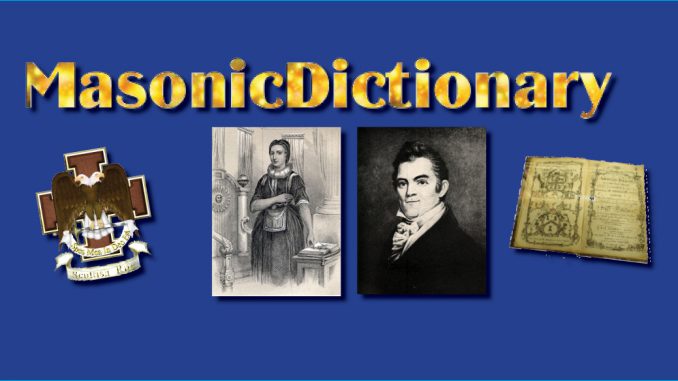
In the election of candidates, Lodges have recourse to a ballot of white and black balls. Some Grand Lodges permit the use of white balls with black cubes. However, the Proceedings of the Grand Lodge of Pennsylvania for 1890 (page 144) show that body decided for itself that “Black balls and not black cubes must be used in balloting in a Lodge,” a decision emphasizing the old practice.
Unanimity of choice, in this case, was originally required; one black ball only being enough to reject a candidate, because as the Old Regulations say:
“The members of a particular Lodge are the best judges of it; and because, if a turbulent member should be imposed on them, it might spoil their harmony or hinder the, freedom of their communication, or even break up and disperse the Lodge, which ought to be avoided by all true and faithful” (see the Constitutions, 1738 edition, page 155).
“But it was found inconvenient to insist upon unanimity in several cases, and therefore the Grand Masters have allowed the Lodges to admit a member, if not above three Ballots are against him; though some Lodges desire no such allowance” (see above Constitutions). This is still the rule under the English Constitution (see Rule 190).
In balloting for a candidate for initiation, every member is expected to vote. No one can be excused from sharing the responsibility of admission or rejection, except by the unanimous consent of the Lodge.
Where a member has himself no personal or acquired knowledge of the qualifications of the candidate, he is bound to give faith to the recommendation of his Brethren of the investigating committee, who, he is to presume, would not make a favorable report on the petition of an unworthy applicant.
Brother Mackey was of opinion that the most correct method in balloting for candidates is as follows:
The committee of investigation having reported, the Master of the Lodge directs the Senior Deacon to prepare the ballot box. The mode in which this is accomplished is as follows: The Senior Deacon takes the ballot-box, and, opening it, places all the white and black balls indiscriminately in one compartment, leaving the other entirely empty. He then proceeds with the box to the Junior and Senior Wardens, who satisfy themselves by an inspection that no ball has been left in the compartment in which the votes are to be deposited.
The box in this and in the other instance to be referred to hereafter, is presented to the inferior officer first, and then to his superior, that the examination and decision of the former may be substantiated and confirmed by the higher authority of the latter. Let it, indeed, be remembered, that in all such cases the usage of Masonic circumambulation is to be observed, and that, therefore, we must first pass the Junior’s station before we can get to that of the Senior Warden. These officers having thus satisfied themselves that the box is in a proper condition for the reception of the ballots, it is then placed upon the altar by the Senior Deacon, who retires to his seat. The Master then directs the Secretary to call the roll, which is done by commencing with the Worshipful Master, and proceeding through all the officers down to the youngest member.
As a matter of convenience, the Secretary generally votes the last of those in the room, and then, if the Tiler is a member of the Lodge, he is called in, while the Junior Deacon tiles for him, and the name of the applicant having been told him, he is directed to deposit his ballot, which he does and then retires.
As the name of each officer and member is called, that brother approaches the altar, and having made the proper Masonic salutation to the Chair, he deposits his ballot and retires to his seat. The roll should be called slowly, so that at no time should there be more than one person present at the box, for the great object of the ballot being secrecy, no brother should be permitted so near the member voting as to distinguish the color of the ball he deposits.
The box is placed on the altar, and the ballot is deposited with the solemnity of a Masonic salutation that the voters may be duly impressed with the sacred and responsible nature of the duty they are called on to discharge.
The system of voting thus described is advocated by Brother Mackey as far better on this account than that sometimes adopted in Lodges, of handing round the box for the members to deposit their ballots from their seats.
There is also the practice of omitting the reading of the names of the officers and members, the Brethren in such cases forming a line and the one at the head advancing separately from the rest to deposit his ballot when the preceding brother leaves the box.
The Master having inquired of the Wardens if all have voted, then orders the Senior Deacon to “take charge of the ballot-box.” That officer accordingly repairs to the altar, and takes possession of the box Should the Senior Deacon be already in possession of the box, as in other methods of balloting we have mentioned, then the announcement by the Master may be “I therefore declare the ballot closed.” In either case the Senior Deacon carries it, as before, to the Junior Warden, who examines the ballot, and reports, if all the balls are white, that “the box is clear in the South,” or, if there is one or more black balls, that “the box is foul in the South.” The Deacon then carries it to the Senior Warden, and afterwards to the Master, who, of course, make the same report, according to the circumstance, with the necessary verbal variations of ”West” and ”East.” If the box is clear, that is, if all the ballots are white, the Master then announces that the applicant has been duly elected, and the secretary makes a record of the fact. But if the box is font, the Master inspects the number of black balls; if he finds only one, he so states the fact to the Lodge, and orders the Senior Deacon again to prepare the ballot-box. Here the same ceremonies are passed through that have already been described. The balls are removed into one compartment, the box is submitted to the inspection of the Wardens, it is placed upon the altar, the roll is called, the members advance and deposit their votes, the box is scrutinized, and the result declared by the Wardens and Master. If again one black ball be found, or if two or more appeared on the first ballot, the Master announces that the petition of the applicant has been rejected, and directs the usual record to be made by the Secretary and the notification to be given to the Grand Lodge.
The Grand Lodge of Massachusetts, 1877 (see also the Constitution of 1918, page 88), provides that the “Master may allow three ballotings, at his discretion, but when the balloting has been commenced it must be concluded, and the candidate declared accepted or rejected, without the intervention of any business whatever.”
Balloting for membership or affiliation is subject to the same rules. in both cases ”previous notice, one month before,” must be given to the Lodge, “due inquiry into the reputation and capacity of the candidate” must be made, and “the unanimous consent of all the members then present” must be obtained.
Nor can this unanimity be dispensed with in one case any more than it can in the other. It is the inherent privilege of every Lodge to judge of the qualifications of its own members, “nor is this inherent privilege subject to a dispensation.”
